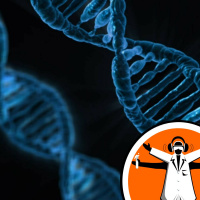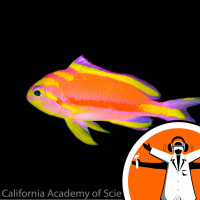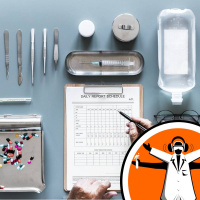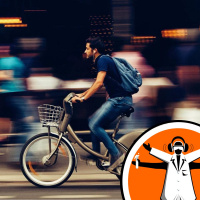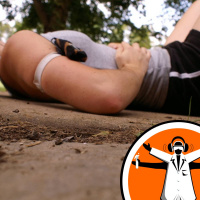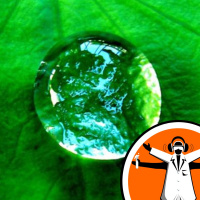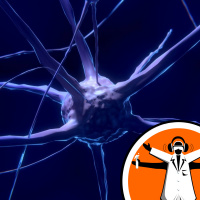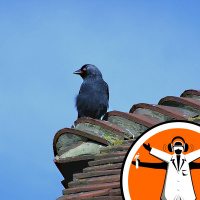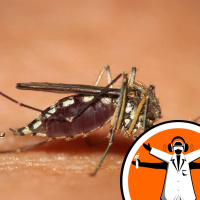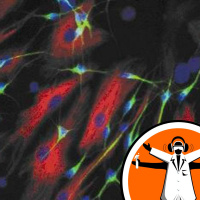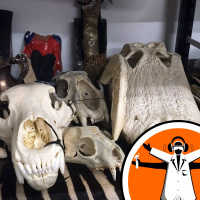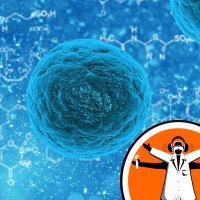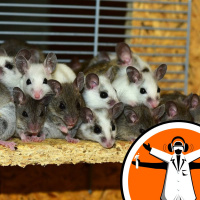Synopsis
Probing the weird, wacky and spectacular, the Naked Scientists Special Editions are special one-off scientific reports, investigations and interviews on cutting-edge topics by the Naked Scientists team.
Episodes
-
World's first robotic eye surgery
21/06/2018 Duration: 04minIf robots really are the future, then said future is certainly one step closer as of this week. For the first time ever, a robot has been used in surgery on the human eye. To find out more about this incredible feat of engineering, Isabelle Cochrane spoke to Dr Tom Edwards, the lead author of the study... Like this podcast? Please help us by supporting the Naked Scientists
-
CRISPR-Cas9: Cure or Carcinogen?
17/06/2018 Duration: 04minCRISPR makes it possible to snip out undesired bits of DNA from our cells. This process holds the potential to cure genetic conditions such as cystic fibrosis. However, it seems that doing this isn't without risk. Marika Ottman went to the University of Cambridge and spoke with biochemist Jussi Taipale to learn more... Like this podcast? Please help us by supporting the Naked Scientists
-
Regenerating tooth enamel
07/06/2018 Duration: 04minResearchers have found a way to regenerate the enamel - or apatite - that's damaged by tooth decay. Katie Haylor spoke to Alvaro Mata from Queen Mary University of London...Sound effects from www.zapsplat.com Like this podcast? Please help us by supporting the Naked Scientists
-
"Fish Elevator" Invented to Study Deep Sea Fish
06/06/2018 Duration: 04minWe know more about the surface of mars than we do about the depths of our own ocean, but scientists from the California Academy of Science created an invention that allows researchers to bring never-before seen species from coral reefs in the deep sea to the ocean's surface. In the spirit of World Ocean's day tomorrow, Marika Ottman spoke with lead author Bart Shepherd to learn more... Like this podcast? Please help us by supporting the Naked Scientists
-
How are new robots helping with surgery?
04/06/2018 Duration: 05minMillions suffer from osteoarthritis, a condition that causes joints, especially knee and hip joints, to become stiff and painful. Luckily these joints can be replaced by an implant with usually good results. However, scientists are going one step further, bringing robots into the operating theatre to improve precision, and patient outcomes. The Nuffield Hospital in Cambridge recently brought in one of these robot helpers, and Chris Smith spoke with the director of the hospital, Adrian Connolly... Like this podcast? Please help us by supporting the Naked Scientists
-
Active commutes may improve heart health
24/05/2018 Duration: 04minAny activity on your daily commute, like walking to the bus instead of just hopping in the car, might reduce your risk of cardiovascular disease, says a new study from the University of Cambridge, published in the journal Heart... Like this podcast? Please help us by supporting the Naked Scientists
-
Kangaroo care: the science of snuggles
23/05/2018 Duration: 06minWe all love a good hug, whatever our age! Babies are no different. There's growing evidence that skin-to-skin contact is beneficial for babies, so Katie Haylor spoke with Laura Baird and Kelly Spike from Addenbrookes Hospital in Cambridge to find out what it's all about... Like this podcast? Please help us by supporting the Naked Scientists
-
An update on Hawaii's eruptions
20/05/2018 Duration: 06minHawaii's Big Island has been experiencing a series of volcanic eruptions. What's causing them, and how is it likely to change in the future? To find out, Chris Smith talked to Jessica Johnson, a volcanologist at the University of East Anglia... Like this podcast? Please help us by supporting the Naked Scientists
-
Could exercise at work be bad for you?
17/05/2018 Duration: 04minExercise is good for us, it's one of the best things you can do to keep your mind and body healthy for a long age. But perhaps not all exercise is equal. A new analysis out in the British Journal of Sports Medecine reports that exercise at work is associated with an increased risk of early death in men. So what's going on? Georgia Mills spoke to study author Pieter Coenen, of VU University in Amsterdam. Like this podcast? Please help us by supporting the Naked Scientists
-
Where is Earth's Freshwater Going?
16/05/2018 Duration: 04minKnowing where Earth's freshwater is accumulating, or perhaps more critically, disappearing is of paramount importance. A new study in Nature has analysed changes in freshwater across the entire planet. To learn more Adam Murphy spoke with Matthew Rodell, from the NASA Goddard Space Flight Centre in Greenbelt, Maryland... Like this podcast? Please help us by supporting the Naked Scientists
-
Understanding neurodegeneration mechanisms in disease
03/05/2018 Duration: 05minNeurodegeneration is a process involved in several serious and debilitating diseases, for which there is often no cure. One of the first steps on the journey towards a treatment to stop neurons dying is understanding how and why they do so. Now, scientists from Cambridge University and the University of Toronto have announced a mechanism that explains how neurons die in two diseases, motor neurone disease and a type of dementia called fronto-temporal dementia. Georgia Mills spoke to Cambridge University chemist Michele Vendruscolo. First, Georgia asked, what actually are neurons? Like this podcast? Please help us by supporting the Naked Scientists
-
Can birds cope with the extreme spring weather?
02/05/2018 Duration: 04minAre you struggling to know what to wear for the weather at the moment? One day in the UK it's freezing, the next rain, the next a veritable heat wave. Apart from playing havoc with BBQ plans, this extreme variation in weather is also affecting local wildlife. Georgia Mills went for a stroll along the river Cam with the RSPB's Richard Bradbury to find out more. Like this podcast? Please help us by supporting the Naked Scientists
-
Tackling Cancer in Tasmanian Devils
26/04/2018 Duration: 04minTasmanian devils are black, carnivorous, scavenger marsupials that live - perhaps unsurprisingly, on the island of Tasmania. In recent years an intriguing type of cancer has been decimating their numbers, pushing the animals to the brink of extinction. Known as "Devil Facial Tumour Disease" - or DFTD - the cancer is spread when an affected animal bites - and literally implants - some of the tumour from its own mouth into the face of another devil. The tumours avoid detection by the immune system by switching off key markers that would normally label the tissue as foreign. Now, by studying the... Like this podcast? Please help us by supporting the Naked Scientists
-
Why are some people tastier to mosquitoes?
22/04/2018 Duration: 05minEvery year millions of people contract malaria, which is a blood parasite infection spread by mosquitoes. And part of the reason why the infection spreads so successfully, scientists now know, is because the parasite makes an infected human over-produce certain skin odours that are irresistible to a mosquito. Chris Smith spoke to Ailie Robinson, researcher at the London School of Hygiene and Tropical Medicine and the lead author on the new study that's uncovered how this happens Like this podcast? Please help us by supporting the Naked Scientists
-
A new model for motor neurone disease
20/03/2018 Duration: 08minMotor neurone disease (MND) is a degenerative disease affecting around 5,000 people in the UK. It attacks people's ability to move, speak and breath, and usually is fatal within two years. At the moment there is no cure, but scientists are trying to find out more about what causes MND and how we might one day treat it. This week, a paper out in Nature Neuroscience describes a new model for MND, which has revealed some unexpected clues about how the disease operates, and may even lead to a target for treatments. Chris Smith spoke to one of the authors Jemeen Sreedheren, from Cambridge... Like this podcast? Please help us by supporting the Naked Scientists
-
Ivory, bear bile and tiger skins: Confiscated contraband
07/03/2018 Duration: 20minWhen people take wildlife products over a border that is under the control of CITES. Some of it is illegal, and this is when Border Force step in, confiscating the items in question and when possible, returning them to the wild. But what do people bring through? Georgia Mills was shown the Dead Shed, by senior Border Force officer Grant Miller, a horrific stash of animal and plant products that had been confiscated at Heathrow Airport. This content may be upsetting to some people. Like this podcast? Please help us by supporting the Naked Scientists
-
Reprogramming Skin Cells to Treat Multiple Sclerosis
26/02/2018 Duration: 06minMultiple Sclerosis, or MS, affects hundreds of thousands of people. It's a condition where the body's own immune system attacks a protective layer around nerve fibres called myelin. This prevents messages being conveyed quickly and faithfully through the brain producing symptoms that can include difficulty with vision, movement, speech, balance and sensation. In recent years scientists have begun to explore the use of stem cells to combat the progression of the disease. As author Stefano Pluchino, from Cambridge University, explained to Chris Smith. Like this podcast? Please help us by supporting the Naked Scientists
-
My whiskers! Faster stroke recovery in mice
07/02/2018 Duration: 05minScientists in the US have uncovered a surprising potential treatment for strokes: short-term sensory deprivation. Strokes occur when the blood supply to the brain is interrupted; this destroys the affected nerve cells, and robs the victim of the function of the affected brain area. But it is possible to achieve some degree of recovery by encouraging other, adjacent healthy parts of the brain to rewire themselves and take over from the damaged area. Working with mice, Washington University neurologist Jin-Moo Lee has found that this can be promoted by temporarily depriving a patch of brain... Like this podcast? Please help us by supporting the Naked Scientists
-
Is walking with friends better than walking alone?
05/02/2018 Duration: 04minWas exercising more one of your new year's resolutions? Has it ended up a broken promise at the bottom of your to-do list? Georgia Mills spoke to Catherine Meads from Anglia Ruskin University, who may be able to help. Like this podcast? Please help us by supporting the Naked Scientists
-
New treatment for heavy periods
29/01/2018 Duration: 04minUp to a third of women experience debilitatingly heavy periods. This can cause significant disruption. It can also lead to depression; time off work; and, in severe cases, even lead to a low blood count or anaemia. Currently, heavy periods are treated hormonally or surgically, but these options have side effects and can affect fertility. So is there a better treatment? Edinburgh University's Jackie Maybin thinks so. Like this podcast? Please help us by supporting the Naked Scientists


